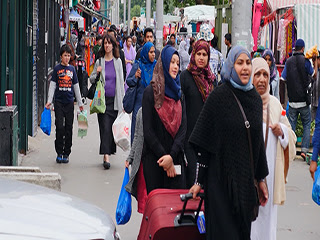Thee San Diego City Council voted Tuesday to join the legal battle against President Donald Trump’s executive order prohibiting refugees from seven Muslim-majority countries from entering the U.S.
The order was blocked temporarily last week by the 9th U.S. Circuit Court of Appeals. San Diego was approached by the city of Chicago to join an amicus curiae brief in support of the State of Washington v. Donald J. Trump, et al, San Diego City Attorney Mara Elliott announced after the court ruling.
Elliott brought the matter to the council, which voted 8-1 in closed session Tuesday to sign on to the brief.
Scott Sherman, one of four Republicans on the council, was the lone no vote.
Mayor Kevin Faulconer, also a Republican, did not have a vote in the decision, but issued a measured statement in support of the council action.
«Americans deserve an immigration policy that keeps us safe without needlessly separating families and shutting our doors on innocent people seeking the American Dream,» he said. «Legal immigration contributes greatly to San Diego’s economy and culture, and our region has taken in more refugees than any other in California. This executive order has a direct effect on San Diegans, and I believe it is appropriate in this case for our city to weigh in.»
The closed-session vote was prefaced by a morning of testimony from a broad section of the community who asked council members to join the brief. Dozens spoke in support of joining, and two spoke against it. Many rallied outside City Hall in favor of the brief.
There was no public discussion among council members after the vote was announced, but council members David Alvarez, Chris Ward — both Democrats — and Sherman issued statements.
“I’m proud that San Diego is joining the State of Washington in the effort to strike down the Executive Order issued by President Trump that restricts immigration and admission of refugees into the United States,” Alvarez said. “This short-sighted action taken by the president is un-American. It has torn families apart and is detrimental to our economy.”
Sherman’s Communication Director Jeff Powell said the councilman opposed using city resources on an unclear national issue rather than focusing on local municipal issues.
“The Council member was asked to sign on to a legal opinion that no one has seen or read,” the statement said. “In addition, the executive order in question is currently not in effect due to a judicial ruling. It is unacceptable to expend valuable and limited resources in the City Attorney’s office on an order that could be rescinded at any moment.”
During a public comment session before the vote was announced, attorney Hud Collins spoke in favor of the ban.
“Since when can anybody be in this city who’s illegal?” he said. “I don’t understand it. Have the citizens of this city gone nuts? ”
One audience member told Collins to sit down and others booed, prompting Council President Myrtle Cole to warn the crowd to be respectful.
“Before you make any decision on the amicus curiae brief, let the city debate about it,” Collins continued. “I assure you our citizens would be for our president and his actions.”
Bob Kuczewski spoke against the city joining the brief on legal grounds and read a passage from the Immigration and Nationality Act citing the president’s authority to suspend any class of aliens deemed detrimental to the interests of the United States,
“That’s the law,” he said. “If you want to change the law, you can follow (former City Councilman Scott) Peters and go to Washington. He’s been there a number of years, and I haven’t seen him propose to change this law.”
Audience members again booed, prompting another reprimand from Cole.
“The rudeness of this group speaks for itself,” Kuczewski said.
In his statement, Councilman Ward called the action a bold vote and commended his colleagues.
“I’ve been overwhelmed in recent months as tens of thousands of San Diegans have mobilized themselves in defense of each other and the values of respect and inclusiveness that define our city,” he said. “I’ve been proud to stand with them in those efforts and today, I’m proud that their City Council has said loud and clear that we will continue to fight for you.”
What impact that action may have is uncertain. The Trump administration may decide not to appeal the court ruling that has put his executive order on hold. Administration officials have suggested he might sign a revised order to enact the travel ban in a different way.
Among those who spoke publicly for joining the brief was Taha Hassane, imam of the Islamic Center of San Diego.
“’There comes a time when silence is betrayal,’” He said, quoting the Rev. Martin Luther King, Jr. “It is imperative that San Diego not remain silent.”
Hassane presented a letter in support of joining the brief signed by about 30 organizations, including the American Civil Liberties Union of San Diego and Imperial Counties, the Council on Islamic Relations, Jewish Family Service, the San Diego and Imperial Counties Labor Council and the New Americans Museum.
“The executive order that established these policies violates fundamental principals of human rights and bedrock tenants of constitutional law, and it betrays our values as a nation of immigrants and San Diegans,” he said.
Others in favor of joining the fight against the ban included a Syrian refugee who said the council’s vote would send a message that he is part of the community, and the son of Afghanistan refugees who got choked up when speaking about how his family was “brought in by Ronald Reagan.”
Referring to Trump’s call for “extreme vetting” of refugees, Shawn VanDiver, co-founder and co-director of the Truman National Security Project San Diego Chapter, said the process already is extreme and takes two or three years.
“The bottom line is that refugees are the most well-vetted group of individuals entering our country, and they also happen to be predominantly women and children,” he said. “Banning groups from coming into the United States is as ineffective at making us safer as it is offensive to our values.”
The president’s executive order seeks to stop the immigration of people from seven countries for 90 days — Iraq, Syria, Iran, Libya, Somalia, Sudan, and Yemen — freeze the refugee program for 120 days, and indefinitely halt immigration of all Syrian refugees.
San Diego, being on the border with Mexico and with a large immigrant population, is in a potentially precarious position with the Trump administration.
Some conservative organizations have called San Diego a “sanctuary city,” a term for local agencies that do not cooperate with immigration authorities. San Diego officials reject that label, contending its law enforcement officers and agents work with federal officials to the extent allowed by state law. Trump has threatened to cut off federal funding to sanctuary cities, though it’s unclear how that’s defined.
On Friday, Homeland Security Secretary John Kelly visited the San Diego-Tijuana border area and met with local law enforcement officials. When he was asked by San Diego Police Chief Shelley Zimmerman what was the definition of a sanctuary city, Kelly replied “I have no clue.”
Further, the president’s push to crackdown on illegal immigration and ramp up deportations of unauthorized people living here could have a significant impact across the region.
And Trump’s threat to revamp the North American Free Trade Agreement or place a 20 percent import tax on goods coming across the border from Mexico would upset a long, symbiotic economic relationship between San Diego and northern Baja.





